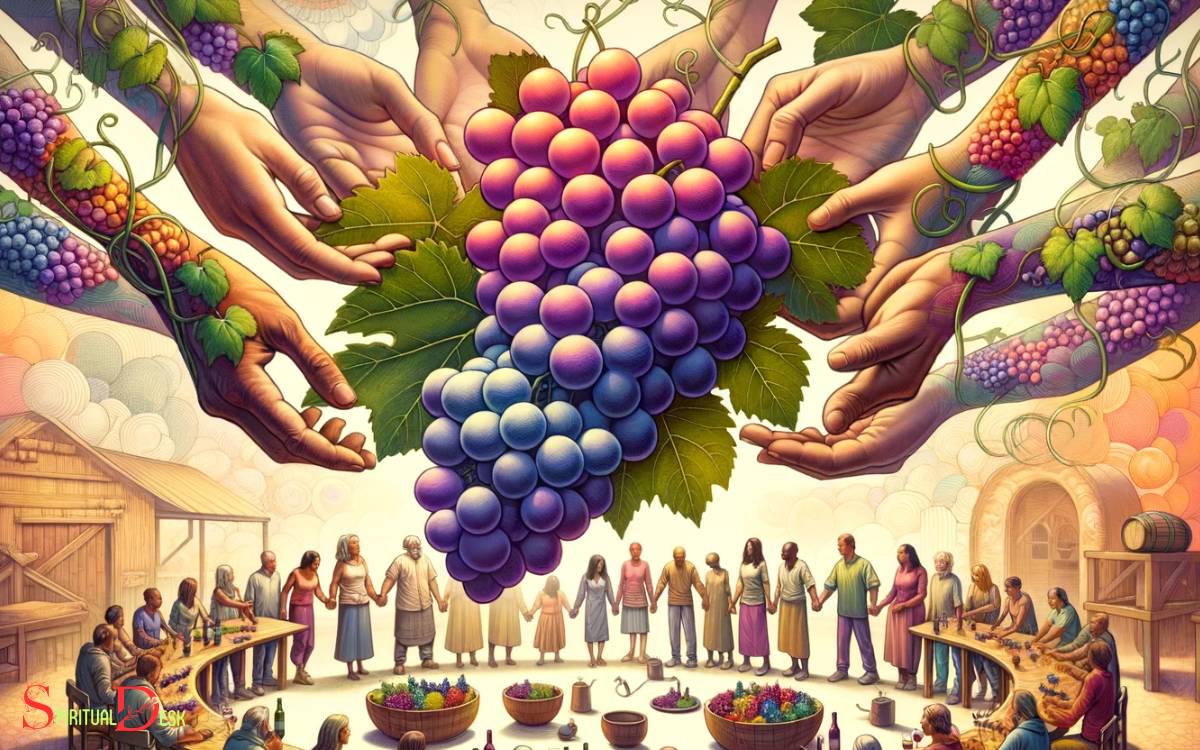What is the Spiritual Meaning of Grapes? Transformation!
The spiritual meaning of grapes represents abundance, transformation, and fertility.
Grapes are often considered as a symbol of spiritual nourishment due to their association with the biblical story of Jesus turning water into wine.
Wine made from grapes plays a significant role in religious ceremonies and is considered a divine gift in various cultures.
Moreover, grapes symbolize the transformation process, as they go through several stages before becoming wine.
Grapes’ spiritual meaning is deeply rooted in various religious and cultural beliefs. They are considered a divine gift that brings abundance and prosperity to lives.
Their transformation from vine to wine represents the ability to grow and change throughout life’s journey.
The multiple seeds within grapes symbolize fertility, further emphasizing their life-giving properties.
In Christianity, the spiritual importance of grapes is seen in the Eucharist, where wine symbolizes the blood of Christ, highlighting their sacred connection to the divine.

Key Takeaway
7 Aspects: Spiritual Meaning of Grapes
| Spiritual Aspect | Meaning of Grapes |
|---|---|
| Abundance | Grapes symbolize abundance, wealth, and prosperity in many cultures. |
| Fertility | Grapes represent fertility and can symbolize the birth of new ideas. |
| Transformation | Grapes undergo a transformation process to become wine, representing personal growth and change. |
| Sacred Offerings | In ancient times, grapes were offered to gods and deities as a symbol of devotion and gratitude. |
| Connection with God | In Christianity, grapes symbolize the blood of Christ and the connection between God and humanity. |
| Rebirth | Grapes can represent the cycle of life, death, and rebirth, as they grow, die, and regrow each season. |
| Unity | Grapes grow in clusters, symbolizing unity, community, and the importance of working together. |
Symbolism in Ancient Cultures

Through the annals of history, grapes have held a multifaceted symbolism within various ancient cultures, reflecting themes of fertility, abundance, and transformation.
You�ll find that these fruits weren�t merely consumed for their succulence but were revered as symbols of life�s cyclical nature.
In ancient Egypt, grapes were associated with Osiris�s rebirth, embodying the eternal cycle of life and death.
Meanwhile, in Greek mythology, Dionysus, the god of wine, symbolized not only the intoxicating power of wine but also the social and spiritual liberation it could offer.
This symbolism suggests that grapes were more than food; they were a profound metaphor for human existence, encapsulating the essence of growth, decay, and the hope for renewal.
Reflecting on this, you can appreciate how grapes served as a spiritual compass for ancient societies, guiding them through the complexities of life.
Five Facts About the Spiritual Meaning Of Grapes
Grapes in Religious Texts

In religious texts, grapes often symbolize divine favor and spiritual abundance, reflecting their deep-rooted significance across different faiths.
This imagery isn�t merely ornamental but serves as a profound metaphor for the spiritual journey and the divine gifts bestowed upon the faithful.
For instance, within the Christian tradition, grapes are pivotal in the symbolism surrounding the Eucharist, representing the blood of Christ and hence the covenant between the divine and humanity.
Similarly, in Islamic texts, grapes are mentioned as one of the fruits found in paradise, symbolizing the rewards awaiting the faithful in the afterlife.
These references aren�t coincidental but are imbued with layers of meaning, inviting believers to reflect on the richness of their spiritual heritage and the bountifulness of divine grace.
Fertility and Abundance

You�ll find that grapes, beyond their culinary delight, embody fertility and abundance through their symbolic harvest significance.
They�ve long been revered as prosperity�s fruitful emblem, marking cycles of growth and renewal in cultures worldwide.
This connection prompts you to reflect on the deeper, spiritual dimensions of abundance in your own life.
Symbolic Harvest Significance
Grapes, symbolizing fertility and abundance, play a pivotal role in various cultural narratives that celebrate the richness and productivity of the earth.
These narratives often weave tales where grapes aren�t just fruits but are emblematic of the cyclical bounty the land offers.
You�ll find that grapes� association with harvest isn�t mere happenstance. It�s deeply rooted in historical agricultural practices where the successful cultivation of grapes was seen as a proof of a community�s ability to sustain and thrive.
This symbolic harvest significance, hence, extends beyond mere fertility and abundance; it encapsulates the human endeavor of nurturing, patience, and the eventual joy of harvest.
It�s a reminder of the interconnectedness of human effort and natural bounty, a reflection on the rewards of collective care and perseverance.
Prosperity�s Fruitful Emblem

Delving into the symbolic zone, grapes emerge as a potent emblem of prosperity, epitomizing fertility and abundance through their lush clusters and bountiful presence.
This symbolism isn�t arbitrary; it�s deeply rooted in the grapevine�s ability to flourish and bear fruit in abundance, mirroring the human desire for growth and prosperity.
When you contemplate grapes within a spiritual context, they�re not just fruits; they represent the culmination of efforts, the blooming of potential into tangible results.
This reflection isn�t merely about physical growth but extends to spiritual and emotional domains, suggesting that prosperity encompasses not only material wealth but also personal and communal well-being.
In engaging with the grape�s symbolism, you�re invited to embrace a broader, more holistic understanding of abundance, one that enriches not just the physical but the soulful aspects of life.
Transformation and Renewal

You observe grapes not only as symbols of fertility and abundance but also as emblems of transformation and renewal. The grape�s journey from vine to wine mirrors your potential for growth and spiritual rebirth.
This process, marked by symbolic growth stages and renewal through fermentation, speaks to the profound significance of spiritual rebirth in your life.
Symbolic Growth Stages
Exploring the symbolic growth stages of grapes reveals profound insights into transformation and renewal.
Grapes undergo a fascinating journey from bud to harvest, mirroring life�s cycles of growth and renewal.
This process isn�t merely biological; it�s laden with spiritual significance, inviting you to reflect on your own phases of development and rejuvenation.
| Stage | Symbolism | Reflection |
|---|---|---|
| Bud | New Beginnings | Starting on new ventures, embracing fresh starts. |
| Flower | Potential | Recognizing inner capabilities, awaiting fruition. |
| Green Grape | Growth | Nurturing talents, overcoming challenges. |
| Ripe Grape | Maturation | Celebrating achievements, preparing for next steps. |
Each stage in this cycle not only marks a physical transformation but also symbolizes spiritual evolvement, urging you to embrace change and growth in your journey.
Renewal Through Fermentation

Through the process of fermentation, grapes undergo a profound transformation, symbolizing spiritual renewal and the shedding of past limitations.
This metamorphosis isn�t merely important but deeply metaphorical, embodying the essence of change and the possibility of new beginnings.
As you explore into this concept, it�s essential to recognize the parallel between the fermentation of grapes and personal growth.
Just as grapes must ferment to reveal their true potential as wine, so too must individuals undergo challenges and periods of change to emerge renewed.
This journey of transformation is marked by the breaking down of the old to make way for the new, illustrating a powerful cycle of renewal that resonates with the human spirit�s quest for meaning and evolution.
Spiritual Rebirth Significance

Building on the metaphor of fermentation, the concept of spiritual rebirth signifies a profound transformation and renewal, inviting individuals to reflect on the cycles of growth that mirror nature�s own processes.
This awakening is not just about shedding the old but embracing the essence of becoming something more enriched and complex, akin to grapes transforming into wine.
As you explore deeper into this journey, it�s crucial to understand the phases you might encounter.
| Phase | Description | Symbolism |
|---|---|---|
| Dormancy | A period of stillness and rest | Preparation |
| Germination | Initial awakening and growth | Potential |
| Growth | Development and strengthening | Progression |
| Ripening | Maturation and refinement | Wisdom |
| Harvest | Culmination and renewal | Transformation |
This cycle reflects the spiritual path of rebirth, highlighting the importance of each stage in achieving a fuller, more enlightened existence.
Community and Unity

Grapes, often seen growing together in clusters, symbolize the inherent strength and productivity found in community and unity.
When you reflect on this imagery, consider how each grape, though individual, thrives because it�s part of a collective.
This idea isn�t merely agricultural but deeply spiritual, suggesting that human beings, similar to grapes, achieve greater heights when connected with others.
This concept of togetherness fosters a sense of belonging, reinforcing the idea that unity isn�t just about physical proximity but also about emotional and spiritual connection.
Essentially, the grape cluster teaches you that your individual strength is magnified when combined with the strengths of others, creating a resilient and productive community.
Grapes as Divine Gifts

Reflecting on the collective strength and unity symbolized by grape clusters, it�s important to recognize these fruits as manifestations of divine generosity and spiritual nourishment.
Grapes, in their abundance and variety, serve as a metaphor for the divine gifts bestowed upon humanity, offering both physical sustenance and spiritual enlightenment.
To explore deeper into their significance:
- Abundance and Fertility: Grapes symbolize the plentifulness of the divine, reminding you of the unending generosity of the universe.
- Transformation and Renewal: Through the process of becoming wine, grapes signify transformation, mirroring spiritual growth and the journey toward enlightenment.
- Communion and Sacredness: Consumed in religious ceremonies, grapes bridge the material to the divine, embodying the sacredness in shared moments of spirituality.
In this light, grapes remind you of the divine�s presence in everyday blessings, urging a deeper appreciation and connection to the spiritual domain.
Conclusion
To summarize, you�ve journeyed through the rich vineyard of meanings that grapes symbolize, from ancient cultures to religious texts.
Like seeds transforming into lush vines, grapes embody fertility, abundance, and the profound cycle of renewal.
They weave a narrative of community, unity, and divine benevolence.
Reflecting on grapes as more than mere fruits, but as symbols laden with spiritual significance, offers a deeper understanding of their role in human culture and spirituality.
FAQ About What Is The Spiritual Meaning Of Grapes
What Is The Spiritual Significance Of Grapes?
Grapes symbolize abundance, fertility, and charity. They also represent selflessness, sacrifice, and divine love.
What Do Grapes Represent In Christianity?
In christianity, grapes represent the blood of jesus christ and are used in holy communion.
What Does It Mean To Dream Of Grapes?
Dreams of grapes suggest good health, prosperity, abundance, fertility, and happiness in life.
Why Are Grapes Associated With Wine?
Grapes are associated with wine because it is made by fermenting the juice extracted from them.
What Are Some Cultural Meanings Of Grapes?
Grapes have different cultural meanings in various cultures. They represent fertility, prosperity, luck, and abundance in many cultures.






